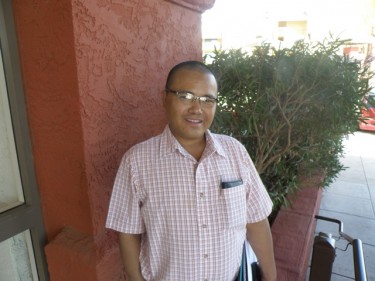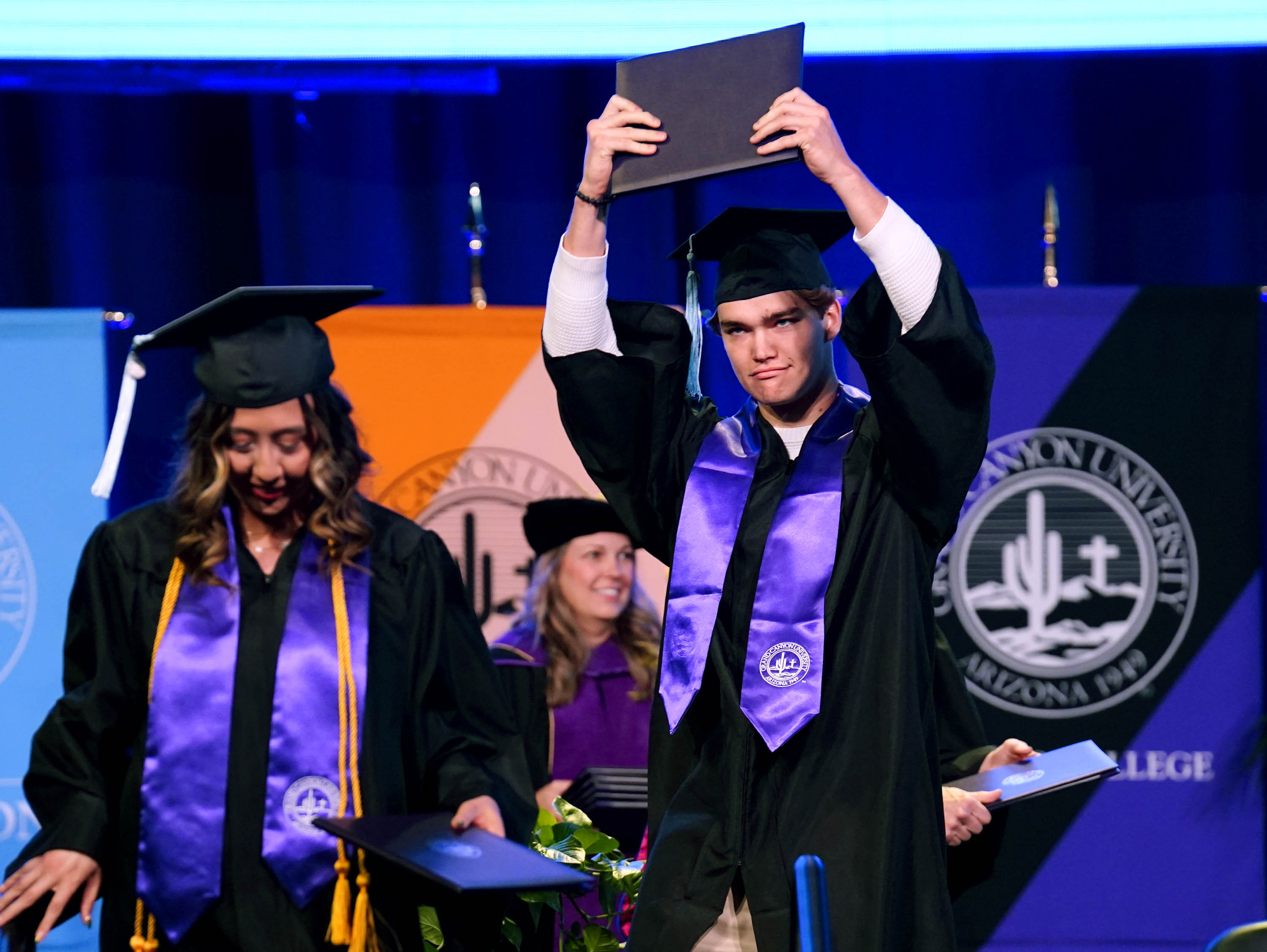By Rick Vacek
GCU News Bureau
To say that Shakta Man Ghale came a long way to attend Grand Canyon University’s College of Doctoral Studies residency this week tells only 18 hours of the story.
Fasten your seat belt. This will be a wild ride.
Ghale, GCU’s first international doctoral learner, traveled from Nepal, situated in the Himalayas northeast of India, to Qatar, then to Philadelphia, then to Louisville, Ky., to visit his sponsors at the Bethel Christian Center in Rockport, Ind., and finally to Phoenix to be at the Pointe Hilton Squaw Peak Resort with 208 other learners. But his journey to reach this point in his life is far more involved than mere air travel.
Let’s start at the top. That aptly describes where people live in the village of Barpak, where the 41-year-old Ghale (his full name is pronounced SHOCK-tah mahn GAHL-ee) grew up. Top, as in the top of a mountain, more than 6,000 feet above sea level. Look up Barpak on the Internet and you’ll see pictures of huts and shacks so close together, they almost seem like one continuous building atop a narrow ridge.
There is no electricity there. No plumbing. No schools. No hospitals. When you need to get somewhere, you walk, usually for days. The crop, in fields plowed by water buffaloes, comes in once a year and feeds the people for a couple of months. The rest of the time, they forage for food. About half of the children die by age 5.
“People are living like it’s the Stone Age. Maybe in 2,000 years they’ll live like the U.S,” Ghale says, smiling. English is his third language, after the native tongue of his home area and Nepali, and he speaks remarkably well. Even after his long trip, he is engaging and animated.
Shakta was 7 when he was wracked by complications from tuberculosis that caused an obstruction in his intestines so severe, his belly was the size of a basketball and his legs were more like sticks. Terrified, his parents walked four days to bring him to Dr. Tom Hale Jr., who did missionary work in the country from 1970 to 1996 with his wife, Dr. Cynthia Hale, and worked at a small hospital in the Himalayan village of Amppipal, 100 miles northwest of the capital, Kathmandu.
The diagnosis was grim. His chances of living even with the surgery were remote. Permission to operate came not from Shakta's father, who had to leave right away to return home, or his mother, who did not speak Nepali. Instead, it came from Shakta himself.
"Normally, Tom would not have operated on him, but the little boy was determined not to die," Cynthia says. "As it was, he almost died on the table, and he lost a lot of blood. His blood pressure was almost down to nothing."
Tom says the three-hour procedure was among the most complicated he ever did there, and that wasn't his only concern.
"If you lose a patient like that with a population that doesn't understand modern medicine, many, many people who have much more curable diseases will be afraid to get treatment," he says.
To make matters worse, Shakta has a rare blood type, and the hospital didn’t have any in supply. His only hope was Dr. Helen Huston, whose O-negative is a universal red cell donor blood type. She had gone to Sunday services and to visit with a friend but felt a tug to return early.
"Going back, I had a feeling I was needed at the hospital, so I walked up the hill as fast as I could," she says.
Huston made it in time to get Ghale the blood transfusions he desperately needed.
“I am one of the blessed," he says, unbuttoning his shirt to reveal a five-inch scar below his navel. "If I didn't have that surgery, I wouldn't be here."
Persecution for Christians
His life was saved in more ways than one. After he recovered, the Hales enrolled Ghale in a mission school. That’s how he became a Christian in a country where, according to Bethel’s senior pastor, Walter Phillips, everything from Buddhism to Hinduism to witchcraft is practiced and for years anyone caught performing a baptism could be sentenced to six years in prison. (The penalty for simply witnessing a baptism was three years.)
Christians there have been routinely persecuted, and Phillips says that when he first entered the country he was warned by authorities that preaching Christianity was prohibited. The country declared itself a secular state in 2006, and a new constitution in 2007 guarantees some religious freedoms but forbids trying to convert anyone.
Phillips, who says it came to him in prayer that he should focus his missionary work on Nepal, talks excitedly about what he has seen there. Prayers for healing are routinely answered, and as word of those miracles spreads whole villages are converted -- he doesn't even need to preach. He says pastors come from every sector of the population of 27 million. Some are even former witch doctors.
“When you tell them about a God who gives instead of takes, you get their attention,” he says. “They’ll do anything for it – experience persecution, even die for it. We’re just a little church, and it’s exciting just to be able to reach these people. Our name is not on anything there – no schools, no churches, no hospitals. They’re running it. It’s theirs 100 percent. It’s uncanny how whoever they pray for gets healed. I’m telling you, what is happening there is not possible.”
'A vision for his people'
But there’s a long, long way to go, and that’s where Ghale’s mission comes in. Phillips met him on a mission trip into the mountains and quickly was taken by Shakta’s determination, as by far the most learned man in the region, to help his people. He already has a master’s in business administration from Virginia International University in Washington, D.C., and his doctorate at GCU will be in business administration with an emphasis in management.
“He has a vision for his people up in the mountains,” Phillips says. “He wants to get this degree and then document things there, such as how many people, where they are and what they need, and bring it to the various governments, get other countries involved. There are countries that will do things, but they just don’t know about it.”
But Ghale, who for years has worked for other countries and the United Nations, is the first to admit that it’s a vision built entirely on faith. When asked how he intends to go about it, he replied, “I’m not sure. I’m just praying and hoping I’ll get some kinds of projects that can help people improve their livelihood. But I cannot do it alone.”
He faces considerable obstacles, including a government still in transition even though it has been six years since King Gyanendra was deposed, ending nearly 2½ centuries of Hindu monarchy. He says Chinese Mafia have infiltrated the country and pose a considerable threat.
The obstacles don’t stop there. Although Kathmandu, where Ghale lives, is a city of nearly one million, most of the people have electricity for only about 10 hours a day. There are hundreds of castes in the country, and only the most elite have power full time.
Internet access a challenge
And then there’s the question of how he’s going to do his field research up in those powerless mountains. Doctorate courses come one after another, and Ghale, who wound up in the GCU program after he just happened to see it on the Internet, will need a special dispensation for the times when he doesn’t have Internet access.
“He’s not your typical doctoral student,” says Richard Conaway, GCU’s international student coordinator. “They’re probably going to have to do some customizing for him.”
Conaway, who says there are two Nepalese undergraduate students on campus, had to coordinate Ghale’s trip with the Department of Homeland Security and then welcomed Shakta when he arrived Monday afternoon.
“He was definitely overwhelmed,” Conaway says. “He was really looking for a friend. He wants to get back to Nepal – you know, America’s great, but he can’t wait to get back to Nepal.”
That’s what Ghale told Phillips, too, when they talked Tuesday morning. “He’s not into the nice things in life,” Phillips says. “He just wants to help people.”
How selfless is he? This much: Phillips says he gave Ghale $300 for food for the trip from Nepal to Louisville. When Ghale arrived, the pastor asked him, just out of curiosity, how much he had spent. The answer: $9.25.
“He is radically honest and demands accountability from anybody who works for him,” Phillips says. “His wife is the same way – totally dedicated to helping people in the physical and the spiritual.”
Ghale intends to take his work far beyond Barpak. He talks of bringing aid to similarly constructed villages in the Himalayas that are 16,000 feet above sea level, where people gather in groups around fires to try to ward off the cold.
“You go there and you will see how people are fighting just to survive,” he says.
Spoken like someone who’s a true survivor himself.
Contact Rick Vacek at 602.639.8203 or [email protected].




